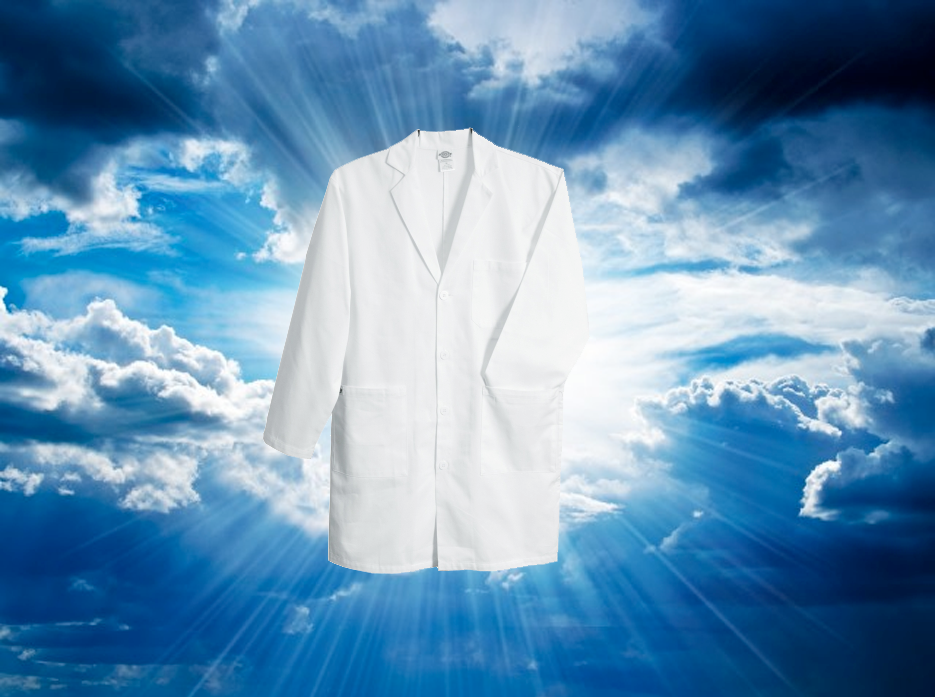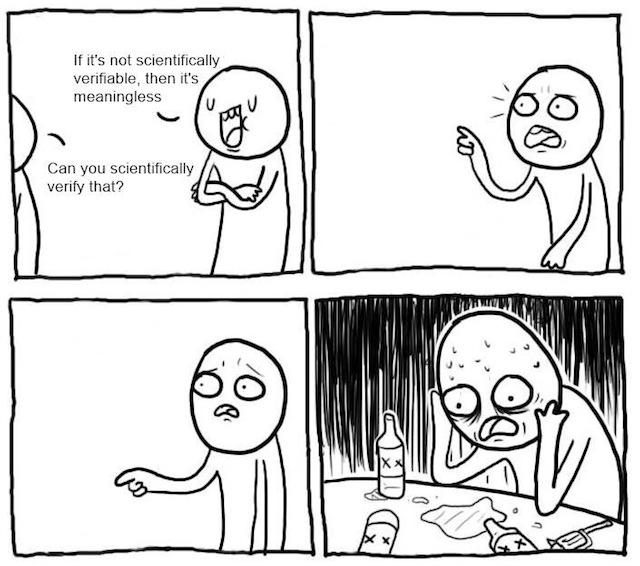For most of human history, society has been subjected to indefensible beliefs—some legitimate, some not—but when the Enlightenment came, many people thought that we as a species were done with superstition, blind faith, and indefensible beliefs. Science will save us from those foolish belief systems! *Plot twist* Much of humanity has crept back into a scary cult in which the adherents blindly follow certain people with such fervor that would make a Spanish inquisitor blush. These cult members will even go so far as to push their overlord’s prescriptions despite their blatant irrationality and despite the negative effects of their ritual. This cult is very real and growing; it is the worship of science itself—the cult of the white lab coat.
The cult of the white lab coat consists of loosely organized groups of people who use the authority of science and medicine, complete with their impressive white lab coats, to push specific ideology on all the unlettered masses. Sure, their intentions are ostensibly good: to save society from itself. But their doctrine is contradictory and their ritual has become one of the most deadly in human history.
The Diagnosis
You can save your outrage at these statements. Almost daily, I encounter someone questioning why on earth anyone would dare doubt science and insisting that you should really just listen to the experts. I’ve had people un-friend me because I dared question the untouchable sanctity of modern medical science. And the prosiletization of the two discussions that elicit the most cultish fervor (global climate change and vaccination) is downright scary. If you don’t agree with the established scientific or medical script, you’re a pea-brained denier on par with those who think the holocaust never happened. When presented with reasonable challenges to their doctrine, the vile hatred and logical fallacies that ensue should require an MPAA rating.
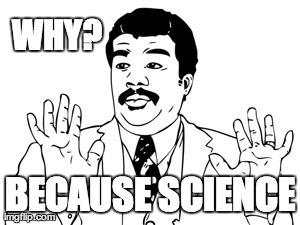 Just the mention of one of the two terms is likely to evoke a ravenous response from cult members: “How dare you even speaketh the words global climate change without the reverence it and the prophet Al Gore—peace be to him—deserve! Off with your head!” Or, “What apostasy is this? You aren’t vaccinating your kids? Doctors say they’re completely safe! They should throw you in prison or at least quarantine your family!” Basically, you must obey our leaders and submit to the scientific/medical consensus because… well because science!
Just the mention of one of the two terms is likely to evoke a ravenous response from cult members: “How dare you even speaketh the words global climate change without the reverence it and the prophet Al Gore—peace be to him—deserve! Off with your head!” Or, “What apostasy is this? You aren’t vaccinating your kids? Doctors say they’re completely safe! They should throw you in prison or at least quarantine your family!” Basically, you must obey our leaders and submit to the scientific/medical consensus because… well because science!
Never mind the fact that blindly following what a scientist says just because she’s a scientist is the exact opposite of science; they persist in their doctrine, which is this: one must believe everything that is considered scientific or medical consensus. If all the experts in a field agreed on something, then it should be accepted as absolute truth. We’ll see how that’s a fundamental misunderstanding of what science is below but a more immediate problem is, there is no such thing as scientific or medical consensus. Science doesn’t stop working on something after a large number of scientists agree on it. Science is a constant flow of information, regularly updating and modifying the knowledge base.
But that doesn’t stop cult members from declaring specific scientific or medical findings dogma. They “close the book on the discussion” and assert that “the debate is over”. George Will wryly observed that if someone claims “the debate is over” that it means two things: “the debate is raging and he’s losing.” Closing the book on discussion or saying “the debate is over” as many do with regard to climate change and anything relating to vaccination is, again, antithetical to science itself. Just imagine if they had said “the debate is over” after the establishment of Newton’s theory of gravity as consensus. We wouldn’t have Einstein’s theory of relativity or the entire field of quantum physics. The debate is never over with regard to scientific discovery, and that’s a good thing.
G.K. Chesterton said, “The special mark of the modern world is not that it is skeptical, but that it is dogmatic without knowing it.” And that is the paradox we find ourselves in—most of the Western world is dogmatically skeptical and that’s a problem.
The Symptoms
David Sackett, often referred to as the “father of evidence-based medicine,” once famously said:
Half of what you’ll learn in medical school will be shown to be either dead wrong or out of date within five years of your graduation; the trouble is that nobody can tell you which half.
It sounds like hyperbole, but the claim is not as ridiculous as one might think. Analyses show that about 13–16 percent of studies in peer-reviewed journals are later reversed. And the editor of one of the most respected medical journals in the world, Richard Horton of Lancet, said, “…much of the scientific literature, perhaps half, may simply be untrue.” The field of psychology could be much worse. A major effort to replicate the findings of 100 psychology studies failed 61 percent of the time, no doubt contributing to the former New England Journal of Medicine editor Marcia Angell’s lamentation, “It is simply no longer possible to believe much of the clinical research that is published, or to rely on the judgment of trusted physicians or authoritative medical guidelines.”
Scientists are not perfect and their conclusions aren’t either. When we as a society blindly follow their recommendations—even when there is a so-called consensus—it can be calamitous.
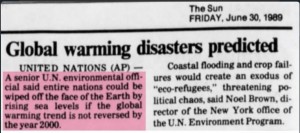 We all know of major claims by modern scientific or medical authority that have since been proven disastrously false. Medical professionals agreed the drug thalidomide was safe and effective at treating anxiety, insomnia, gastritis, and tension and nausea and morning sickness in pregnant women but was later determined to cause limb deformities in babies. In 1985, there was a “broad scientific consensus” that acid rain destroyed lakes and forests and ”is a threat to our health.” After 10 years and $500 million, it was determined that, “acid rain was not damaging forests, did not hurt crops, and caused no measurable health problems.” Today’s polio vaccine is fairly harmless but the first hundreds of thousands of doses proved to be defective and led to 40,000 cases of polio, leaving 200 children with varying degrees of paralysis and killing 10. The early polio vaccines also included a strain of simian virus that led to a dramatic increase in soft-tissue cancer in the subsequent decades. The FDA had to retract its stamp of approval on Vioxx after it was shown to cause an increased risk of heart attack and stroke and suddenly the USDA says that eggs may not increase cholesterol after decades of asserting the opposite. And recently, the federal government is lowering its recommendation of fluoride in drinking water after finding its previously recommended amount as harmful to health. Phrenology, the psychological blank slate, the luminiferous aether, and the cosmological steady state were all scientific consensus in their prime.
We all know of major claims by modern scientific or medical authority that have since been proven disastrously false. Medical professionals agreed the drug thalidomide was safe and effective at treating anxiety, insomnia, gastritis, and tension and nausea and morning sickness in pregnant women but was later determined to cause limb deformities in babies. In 1985, there was a “broad scientific consensus” that acid rain destroyed lakes and forests and ”is a threat to our health.” After 10 years and $500 million, it was determined that, “acid rain was not damaging forests, did not hurt crops, and caused no measurable health problems.” Today’s polio vaccine is fairly harmless but the first hundreds of thousands of doses proved to be defective and led to 40,000 cases of polio, leaving 200 children with varying degrees of paralysis and killing 10. The early polio vaccines also included a strain of simian virus that led to a dramatic increase in soft-tissue cancer in the subsequent decades. The FDA had to retract its stamp of approval on Vioxx after it was shown to cause an increased risk of heart attack and stroke and suddenly the USDA says that eggs may not increase cholesterol after decades of asserting the opposite. And recently, the federal government is lowering its recommendation of fluoride in drinking water after finding its previously recommended amount as harmful to health. Phrenology, the psychological blank slate, the luminiferous aether, and the cosmological steady state were all scientific consensus in their prime.
More disturbing than all of these is a terrifying statistic: the third-highest cause of death in America (behind heart disease and cancer) is iatrogenic illness—that is illness caused by medical care (unnecessary surgery, error or infection in the hospital, adverse effects of pharmaceuticals). That’s right, more people die from “expert” medical care than diabetes, Alzheimer’s, and the flu combined.
This litany of horrors isn’t to say that the scientific method is bunk or that everything a medical professional says should be ignored. It’s just point out the glaringly obvious fact that experts aren’t always right and that oftentimes they are very wrong.
The Cause
Richard Horton, quoted above, went on to say that science has taken a “turn towards darkness.” But why should an institution so productive and robust succumb to the dark side? Horton attributes it to, “…small sample sizes, tiny effects, invalid exploratory analyses, and flagrant conflicts of interest, together with an obsession for pursuing fashionable trends of dubious importance…”
And clearly, science suffers from mistakes and corruption just like any other human institution. A widely-publicized political science study conducted by a professor at UCLA, sponsored by Columbia political science expert, and published by the journal Science showed that a brief conversation about marriage equality with a canvasser who revealed that he or she was gay had a dramatic effect on voters’ views and their immediate network. An undergrad who was impressed with the results decided to look into it and found that the entire study was fraudulent. Jesse Stengel, who reported on the story for Science of Us explained the collapse of science as:
Over and over again, throughout the scientific community and the media, LaCour’s impossible-seeming results were treated as truth, in part because of the weight [Columbia professor] Green’s name carried, and in part, frankly, because people — researchers, journalists, activists — wanted to believe them.
This wasn’t some large monetary conflict of interest, these people just wanted the results to be as reported and so they perpetuated the fraud.
But deeper than the small sample sizes and the conflicts of interest and the political motives is a fundamental characteristic of science—and medical science by extension—which leads to its fatal conceit. Science doesn’t prove anything but people (even some scientists) believe that it does. You see, some people think science proves universal truths when in reality, it only shows what happen in any given experiment. The scientific method utilizes induction—reasoning from a limited number of observations toward a general conclusion. An example would be a pharmaceutical company testing a new drug on 10,000 people. One may feel comfortable that the drug is safe to take after that test, but it is illogical to say that with certainty the drug is harmless since the experiment was limited and may have been flawed. There’s nothing that says the 10,001st person to try the drug wouldn’t die from it. That’s why you can’t say that science proves anything; it only disproves.
Yet, we constantly hear that “science proves this” or “doctors proved that” and the folklore grows with every claim until the vast majority of people accept these so-called proofs without a hint of skepticism.
The Prescription
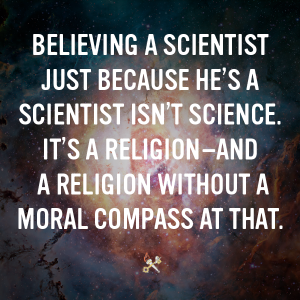 So what am I saying, we should just stop doing science and go back to nature like a band of frolicking modern Rousseauians? Not remotely. Science is a valuable tool for us humans to gain knowledge. But we should be scientific in our acceptance of science. The problems we see riddling science today are the cost of people blindly accepting what scientists and medical professionals say as gospel. We laypeople need to be skeptical of this cult of the white lab coat and their pushers, no matter how many initials they have after their names. Science is great—it is not God. Treating it as such does a disservice to the worshipers as well as the institution itself—it is, after all, the converse of science.
So what am I saying, we should just stop doing science and go back to nature like a band of frolicking modern Rousseauians? Not remotely. Science is a valuable tool for us humans to gain knowledge. But we should be scientific in our acceptance of science. The problems we see riddling science today are the cost of people blindly accepting what scientists and medical professionals say as gospel. We laypeople need to be skeptical of this cult of the white lab coat and their pushers, no matter how many initials they have after their names. Science is great—it is not God. Treating it as such does a disservice to the worshipers as well as the institution itself—it is, after all, the converse of science.
David Sackett followed up his famous quote above with a recommendation. He said that you don’t know what medical finding is going to be overturned, so the best thing to do is, “to learn how to learn on your own.” And that advice is good for laypeople as well as medical professionals. Stop blindly following the experts and start thinking for yourselves! We live in an age in which medical research is possible for everyone with an Internet connection—let’s take advantage of that. We don’t need more sacrifices to the cult of the white lab coat; what we need is more critical thinkers.
Eric Robert Morse summarizes this in his criticism of modern pseudoscience, Psychonomics:
Our challenge in this age of science is not to achieve the next great breakthrough or figure out a way to support science more—that will come naturally. Rather, our challenge is to prevent our excitement for science from leading us blindly down the path of error or, what’s worse, oblivion. It is a formidable challenge without question. We will succeed in it as long as we can achieve two things: promote science and do so without giving up our own ability and intent to think and reason.
